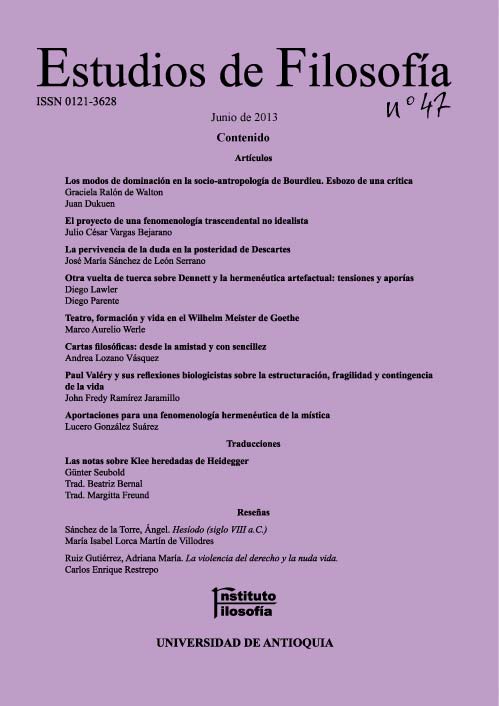The Persistence of Doubt after Descartes
DOI:
https://doi.org/10.17533/udea.ef.16646Keywords:
Cogito, discourse, doubt, ground, image, infinite, representation.Abstract
How it is to be understood that one of the most epoch-defining innovations of Cartesian thought, i. e., methodic doubt, has not been adopted by Descartes’ immediate philosophical posterity? This paper investigates the reasons for this supposed disappearance of doubt in the philosophies of Spinoza and Leibniz by means of a reexamination of the role of doubt in Descartes’ Meditations. Starting from a characterization of the Cartesian project as a search for the ground, the paper shows that Descartes’ interpretation of immediate reality in terms of representation is actually the apotheosis of a more ancient view that conceives the totality of being as contingent and vain. Thus, doubt is not a free suspension of judgement, but the inevitable irresolution that results from the lack of ontological solidity that is a feature of immediate reality when interpreted as image or representation. It is then shown that postcartesian thought actually does not dismiss doubt, but incorporates it as a basic assumption, which explains why there is no definite place for it in discourse. The further development of modern thought can, in crucial ways, be explained by means of this implicit assimilation of doubt and its consequences.
Downloads
References
CATON, H. (1973) The Origin of Subjectivity. An Essay on Descartes, New Haven and London: Yale University Press.
COUTURAT, L. (1961) La logique de Leibniz, Hildesheim: Olms.
DESCARTES, R. (1964-1974) Œuvres de Descartes, ed. Ch. Adam y P. Tannery, 11 vol., Paris: Vrin/C. N. R. S.
DÜTTMANN. A. G. (2000) “Lifeline and self-portrait”, en: Gill, C. B. (ed.), Time and the image, Manchester: Manchester University Press.
GUEROULT, M. (1953) Descartes selon l’ordre des raisons, 2 vol., Paris: Aubier.
GUEROULT, M. (1968) Spinoza I: Dieu, Paris: Aubier.
GUEROULT, M. (1974) Spinoza II: L’âme, Paris: Aubier.
GUEROULT, M. (1970) Etudes sur Descartes, Spinoza, Malebranche et Leibniz, Hildesheim: Olms.
KOPPER, J. (2004) Das Unbezügliche als Offenbarsein. Besinnung auf das philosophische Denken, Frankfurt am Main: Peter Lang.
KRÄMER, S. (1991) Berechenbare Vernunft. Kalkül und Rationalismus im 17. Jahrhundert, Berlin/New York: De Gruyter. DOI: https://doi.org/10.1515/9783110847079
LEIBNIZ, G. W. (1960-1961) Die philosophischen Schriften von Leibniz, ed. C. I. Gerhardt, reimpresión Hildesheim: Olms.
LEIBNIZ, G. W. (1903) Opuscules et fragments inédits de Leibniz. Extraits de manuscripts de la Bibliothèque royale de Hanovre, ed. L. Couturat, Paris: Alcan.
MARION, J.-L. (1975) Sur l’ontologie grise de Descartes. Savoir aristotélicien et science cartésienne dans les Regulae, Paris: Vrin.
MARION, J.-L. (1981) Sur la théologie blanche de Descartes, Paris: PUF.
MARTÍNEZ MARZOA, F. (1991) Cálculo y ser (Aproximación a Leibniz), Madrid: Visor.
MARTÍNEZ MARZOA, F. (1994) Historia de la filosofía, 2 vol., Madrid: Istmo.
MARTÍNEZ MARZOA, F. (1999) Heidegger y su tiempo, Madrid: Akal.
MARTÍNEZ MARZOA, F. (2009) Pasión tranquila. Ensayo sobre la filosofía de Hume, Madrid: A. Machado Libros.
MASON, R. (1997) The God of Spinoza: A Philosophical Study, Cambridge: Cambridge University Press. DOI: https://doi.org/10.1017/CBO9780511583230
MICRAELIUS, J. (1966) Lexicon philosophicum terminorum philosophis usitatorum, Düsseldorf: Stern/Verlag Janssen & Co.
SCHELLING, F. W. J. (1976 ss.) Historisch-kritische Ausgabe, im Auftrag der Schelling-Kommission der Bayerischen Akademie der Wissenschaften, hrsg. v. H. M. Baumgartner, W. J. Jacobs, H. Krings u. H. Zeltner, Stuttgart: Fromann Holzboog.
SEPPER, D. L. (1996) Descartes’s Imagination. Proportion, Images, and the Activity of Thinking, Los Angeles: University of California Press.
SERRES, M. (1968) Le système de Leibniz et ses modèles mathématiques, Paris: P.U.F.
SEVERINO, E. (1980) Destino della necessità, Milano: Adelphi.
SPINOZA, B. (1925) Opera, im Auftrag der Heidelberger Akademie der Wissenschaften hrsg. v. C. Gebhardt, Heidelberg: Winter.
WILLIAMS, M. (1986) “Descartes and the Metaphysics of Doubt”, en: Rorty, A. O. (ed.) Essays on Descartes’ Meditations, Los Angeles: University of California Press. DOI: https://doi.org/10.1525/9780520907836-008
WILSON, M. D. (1986) “Can I Be the Cause of My Idea of the World? (Descartes on the In nite and Inde nite)”, en: Rorty, A. O. (ed.) Essays on Descartes’ Meditations, Los Angeles: University of California Press. DOI: https://doi.org/10.1525/9780520907836-017
Downloads
Published
How to Cite
Issue
Section
Categories
License
Copyright (c) 2013 José María Sánchez de León Serrano

This work is licensed under a Creative Commons Attribution-NonCommercial-ShareAlike 4.0 International License.
Authors who publish with this journal agree to the following terms:
1. The Author retains copyright in the Work, where the term "Work" shall include all digital objects that may result in subsequent electronic publication or distribution.
2. Upon acceptance of the Work, the author shall grant to the Publisher the right of first publication of the Work.
3. The Author shall grant to the Publisher a nonexclusive perpetual right and license to publish, archive, and make accessible the Work in whole or in part in all forms of media now or hereafter known under a Creative Commons Attribution-NoCommercia-ShareAlike (CC BY-NC-SA 4.0), or its equivalent, which, for the avoidance of doubt, allows others to copy, distribute, and transmit the Work under the following conditions: (a) Attribution: Other users must attribute the Work in the manner specified by the author as indicated on the journal Web site;(b) Noncommercial: Other users (including Publisher) may not use this Work for commercial purposes;
4. The Author is able to enter into separate, additional contractual arrangements for the nonexclusive distribution of the journal's published version of the Work (e.g., post it to an institutional repository or publish it in a book), as long as there is provided in the document an acknowledgement of its initial publication in this journal;
5. Authors are permitted, and Estudios de Filosofía promotes, to post online the preprint manuscript of the Work in institutional repositories or on their Websites prior to and during the submission process, as it can lead to productive exchanges, as well as earlier and greater citation of published work (see The Effect of Open Access). Any such posting made before acceptance and publication of the Work is expected be updated upon publication to include a reference to the Estudios de Filosofía's assigned URL to the Article and its final published version in Estudios de Filosofía.















